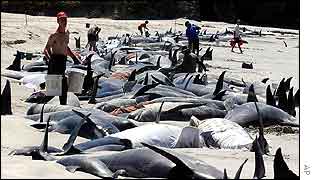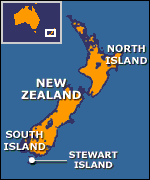|
Rescuers succeeded in refloating 39 of the 159-strong pod during high tide on Wednesday.
Eighty of the whales had already died when the
distressed animals were first spotted.
The whales had beached on Stewart Island,
New Zealand's southernmost island, which
has become a notorious spot for whale strandings.
By nightfall on Wednesday, the rescued whales had
moved about 2.4 kilometres (1.5 miles) into open sea.
Greg Lind, southern area manager of the
Department of Conservation, said the rescue effort
was "a very good result".
Manhandling
Mr Lind said earlier that the key was to get the whales far enough outside the enclosed bay near the Neck beach where they washed ashore that they do not beach themselves again overnight.
Small boats were used to herd the rescued whales away from the beach and into open water.
Mr Lind said a plane will fly over the area at daybreak on Thursday to check that the survivors had not returned to the beach.
The remaining dead whales will be left to rot on the beach, which is rarely visited.
Pilot whales look like dolphins and grow up to five metres (16 feet) long and weigh as much as three tonnes.
It was not clear why they had become stranded. Scientists do not fully understand the reasons for beachings, but believe illness or other trauma could play a role.
|

